Desi Pubs Are A Thing In The UK
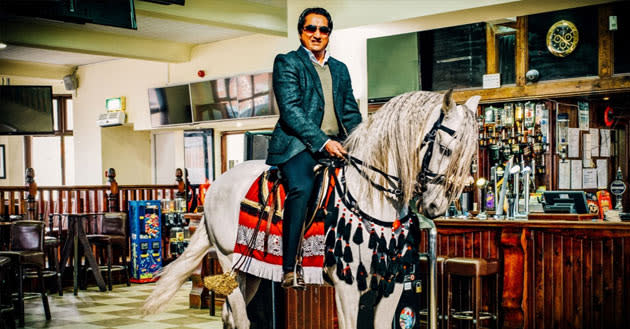
Behind the bar, you’ll find Bhangra, Punjabi food, and Mr. Singh.
The pub: an institution that’s as British as the Queen and as ubiquitous as bad weather.
In the UK, the pub is the cornerstone of a community, a place where everyone knows the landlord’s name and becomes intimate with each other’s personal business.
The same goes for so-called desi pubs: establishments that are run by and cater to the British Asian community. These pubs offer something more than the standard pies, ales and board games. Instead, you’ll find bhangra, Punjabi food and Mr. Singh behind the bar. Uniquely British Asian, desi-pubs are islands of multiculturalism that highlight the best East meets West, of social cohesion in modern Britain.
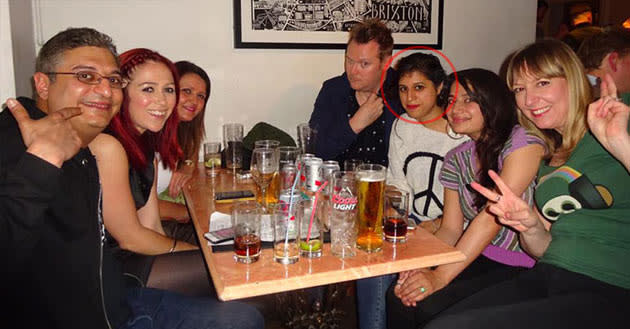
With some friends at a pub in Brixton, South London, before heading to a funk and soul night
I live in Croydon, an area 25 minutes south of Central London that’s home to a large Asian community. My local desi-pub is called the Crown & Pepper, and it’s a favourite in my household — one of the few restaurants to which my parents will venture on a weeknight. The Indo-Chinese fusion menu offers dishes like chilli paneer and veg tempura, both of which go down well with a pint of ale.

Prince of Wales, whisky bottles and a dhol. By Anand_Sra
Of all the memorable nights I’ve spent in the Crown & Pepper, the best has to be Christmas eve from a few years ago. All of my closest friends were back home for the holiday, and we celebrated the occasion by downing many beers while bhangra blared in the background. Yet there was a distinctively Christmas vibe, with tinsel, mistletoe and a big Christmas tree in the corner. We counted down to midnight with cheesy Christmas classics, but as it midnight struck, the DJ played Punjabi MC’s ‘Mundian To Bach Ke’. The crowd went wild to this mix of bhangra and Christmas tunes, which kept us partying until the early hours of the morning.

Some of my closest friends and me at a local favourite called the White Hart pub, South London
The West Midlands has a rich history of South Asian migration. During the 1950s and 1960s, thousands of Indians came to the UK in search of good jobs and a better lives. Many found work in local factories, which at the time were producing metal, steel, iron and coal. The region’s industrial heritage has earned the nickname “the Black Country” because of all the air pollution the factories created.
More from 101India: Travel & Food
According to some figures, by 1961 there were around 100,000 South Asian men living in the UK, a figure that would grow quickly over the next few years as new legislation allowed wives and children to join their husbands. New shops, religious centres and local services emerged. But these new communities weren’t welcomed by everyone - signs like ‘No Blacks, No Dogs, No Irish’ were regularly seen on shop windows and Asians were banned from buying property on certain roads.
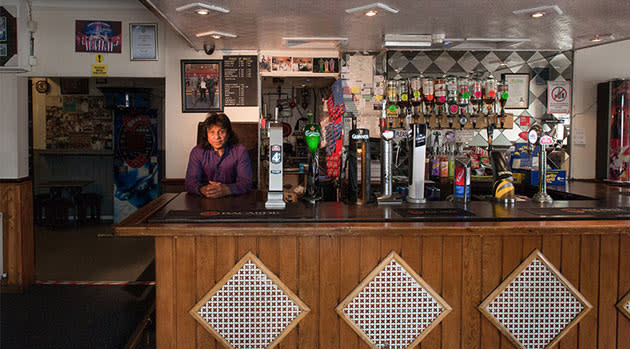
Prince of Wales pub, Black Country
60-year-old landlord Lakhbir Singh has been living in the West Midlands since the 1970s. He recalled a time when Asians were not allowed to drink in pubs.
He said: “The customers were mostly white people and they didn’t want Asians drinking in the same pub, so the landlord had no choice but to keep us out. Instead, he would serve beers outside and passed them through the hatchers. There were a lot of fights between Asians and white people during this time.”
By the mid-70s, many of the pubs run by white landlords were increasingly decrepit. As more and more Asians started to enter the pub industry, they started to play a big role in salvaging the pub trade by reinventing the pubs for new communities. This resulted in the redefinition of pub culture in the UK.
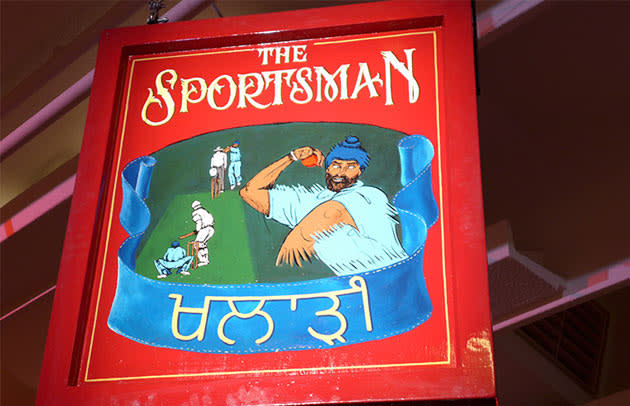
The Sportsman pub sign
Satnam Singh’s dad, Jit, bought the Red Lion pub over 20 years ago. He said that the pubs showed members of various communities how small the differences were between them and their neighbours. He said: “At that time there weren’t many desi-pubs and many people didn’t like us Asians drinking with them. But then all of a sudden, one day there’s an Asian running the pub! Many customers decided to leave. But those who stayed on started to realise how similar we all were. We go to work, like to have a drink or two, we have the same moans about families and kids. They realised that actually, there’s not much difference between us and them. So the pub played a big role in social cohesion and bringing these two communities together.”

New beginnings, Red Lion pub. By Steven Cartwright
Beera Mahali, the 60-year-old landlord of the Red Cow pub, credits the success of these pubs down to treating each person equally. He said: “People know we are here to help if they need it, we treat people fairly and without any bias. That makes people feel comfortable.”
More from 101India: Gora Gansa Part 2: Aggressive Anti-Vegetarianism On Mohammad Ali Road
Today, there are around 50 desi pubs that serve traditional ‘Punjabi dhaba’ style curry, as well as their own unique signature dishes. Celebrity chef Cyrus Todiwala trained at the Taj restaurant chain and now runs a number of high-profile restaurants in London and India. He was so taken by the concept of a desi pub that he decided a trip up to the Black Country to find out more. He said: “It’s interesting to see how they’ve managed to build two things – a very typical British institution, the pub, with a very typical British-Indian aspect, the food.”
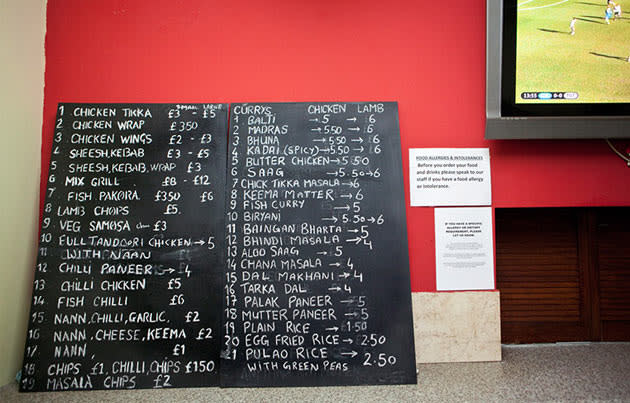
Prince of Wales pub menu. By Anand_Sra
Disclaimer: The views expressed in this article are independent views solely of the author(s) expressed in their private capacity and do not in any way represent or reflect the views of 101India.com.
By Gouri Sharma
The images were commissioned by Creative Black Country, a community arts project funded by England’s Arts Council and based in the West Midlands.

 Yahoo News
Yahoo News 
